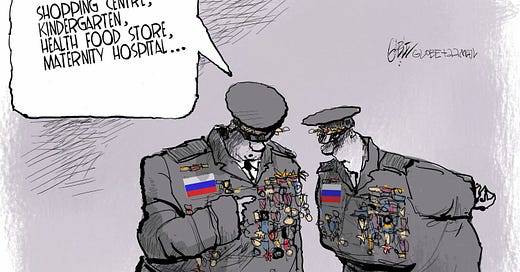Who benefits from bad news?
A reply by Sri Aurobindo and excerpts from a pertinent post by Timothy Snyder
In recent months there has been much talk of a stalemate in Russia’s war of aggression against Ukraine, whose stated aim has been and remains the total annihilation not only of a free country but also of its people — in a word, genocide.
There has been talk of a frozen conflict, the CATO Institute asking “Could the Ukraine War Become the Mother of All Frozen Conflicts?” and suggesting, unsurprisingly, that “Biden should press Volodymyr Zelensky’s government to negotiate the best peace accord that it can with Russia”— as if Russia had ever honored an accord, upheld an agreement, or abided by a treaty.
In the The Washington Examiner one reads, “As counteroffensive shows little progress, Ukraine battles another foe: Pessimism,” and the National Review reports on “Pessimism from the Front Lines to the Corridors of Power in Kyiv.”
Similar sentiments are expressed in many major newspapers and other media, both mainstream and alternative.
Last Thursday, The Economist warned that it would be a mistake to bank on a breakthrough at the front lines in the coming weeks, writing that both Ukraine and its Western supporters are coming to realize that this will be a grinding war of attrition. A most asymmetric kind of attrition, I should add, since one difference between Ukrainians and Russians is that the former value the lives of their compatriots while the latter clearly do not.
Such disheartening news (whether fact-based or fake) raises the obvious question of who benefits from promoting it. To this question I found a perfect answer in a letter written by Sri Aurobindo1 a year before the end of World War 2.
In a letter to Sri Aurobindo, a sadhaka (disciple) had mentioned speculations made by other disciples about Allied setbacks and had asked “whether I am right in feeling that speculating intellectually about Allied reverses is not a right movement as it may easily lead us, unawares, into sympathy with the hostile hordes who are against your work.” Sri Aurobindo’s reply begins with this general observation:
All these things are silly utterances in which the wishes of the mind are presented as truth and fact. That is a common habit in this very imperfect humanity and ordinarily it would be of no importance, except that such inventions and falsehoods are most improper in the mouth of a sadhaka and the habit must be a great obstacle to any progress.
Next Sri Aurobindo turns to the specific questions regarding the origin of those wishes and who benefits from them:
But here the wish behind, whether they [the sadhakas] are conscious of it or not, is that the Asura shall prevail against the Divine. That means a most dangerous giving of oneself to the Falsehood that is seeking to prolong its hold on the world and establish definitely the reign of Evil over the whole world. That is what the victory of Hitler would have meant—it would have meant also the destruction of my work. You are quite right therefore in resenting this kind of attitude (also there is the fact that it establishes a centre of support for the Falsehood and Evil in the Ashram). The propagation of this Falsehood, false ideas, false feelings, false actions and persuading people that they are right is the chief instrument of the Asura and its prevalence and success a sign of the growth of darkness on the earth. Fortunately the intensity of the peril is over, however long the struggle may still last. Other perils and manoeuvres of the Asura may follow afterwards; so it is good to discourage firmly the tendency so that it may not do harm hereafter.
The intensity of the peril was over because on June 6, 1944 — four days before the date of Sri Aurobindo’s letter — British, US, and Canadian troops had successfully landed on the Normandy beaches of France.
The actual beneficiary from today’s disheartening news has been identified by many clear-eyed observers, albeit generally in more secular terms. What follows are extracts from a post by Yale historian Timothy Snyder, one of the most knowledgeable among them.
When the war does not quickly end, we jump to the idea that it is a “stalemate,” which is a situation that lasts forever. This is false, and serves as a kind of excuse not to figure out what is going on....
Russia now has no meaningful offensive potential. Its strategy is to continue terror against civilians until Ukrainians can endure no longer. This, judging from my experience anyway, is not a tenable approach. On the other hand, Russia has had time to extensively fortify a long [line] of defense in the east and south, and to prepare for Ukrainian offensives. This makes Ukrainian offensives very difficult.
Ukraine did want to press forward last year, before the fortifications were built. It lacked the necessary weapons, and Elon Musk chose to cut Ukraine off from communications. That move likely extended the war. Because Musk’s decision was based on his internalization of Russian propaganda about nuclear war, and was accompanied by his repetition of that propaganda, he made a nuclear war more likely. If powerful men convey the message that just talking about nuclear war is enough to win conventional wars, then we will have more countries with nuclear weapons and more conventional wars that can escalate into nuclear ones. Ukraine has been resistant to this line of Russian fearmongering, fortunately for us all.
Ukraine did not have the arms it needed last year in part for the same reason: Americans allowed Russian propaganda to displace strategic calculation. By now, though, the American side has generally understood that Russia’s nuclear threat was a psychological operation meant to slow weapons deliveries. The United States and European partners have delivered arms to Ukraine, which has been absolutely indispensable. Historically speaking, though, the pace is slow. Fighter planes are coming, but a year late for the current offensive. So Ukrainians are now trying an offensive in conditions that American staff officers would find challenging....
The fighting this summer has been very hard and very costly for Ukraine, harder and costlier, I think, than it had to be. I visited wounded soldiers in a rehabilitation center earlier today; among the many feelings this aroused was some guilt that my people could have done more to protect these people. (If you want to protect them, consider a gift to Come Back Alive or United24 or Unite with Ukraine).
That said, Ukrainian territorial advances this summer have been sufficient to trigger a barrage of calls for a cease-fire from Kremlin-friendly voices. Given the way our media seems to work, these calls (rather than the events on the ground) sometimes seem to be the news. Pro-Kremlin op-eds smuggle in the assumption that Ukraine is not advancing, when in fact it is. The Kremlin allies make their case in terms of Ukrainian suffering, but never cite Ukrainians, nor the polling data that shows overwhelming support for the war.
There is zero reason to believe that the Kremlin would actually feel constrained by such an agreement in any place; it did not even begin to hold to the terms of the agreement after its last invasion, and in invading again Moscow has violated all of its agreements with Ukraine (while making clear that it does not consider Ukraine a state). Russian propagandists talking to Russian audiences do not hide that the goal is the destruction of the Ukrainian nation, and that a ceasefire would just be meant to buy time. Now that the nuclear bluff has largely worn itself out, Moscow has changed its approach, trying instead to make people believe that nothing is happening on the battlefield. Moscow’s hope is to motivate Ukraine’s allies to restrain Ukraine long enough for Russia to shift the balance of forces in its favor....
This war has brought an entirely new theory of what a defensive war means: fighting only on one’s own territory. This does not correspond to international law and has never made any sense. It is a bit like rooting for a basketball team but believing it should play without ever taking the ball past half court.... The voiced concern is that Russia could “escalate.” This argument is a triumph of Russian propaganda. None of Ukraine’s strikes across borders has done anything except reduce Russian capacity. None has led Russia to do things it was not already doing. The notion of “escalation” in this setting is a misunderstanding. In trying to undo Russian logistics, Ukraine is trying to end the war. Ukraine will not do in Russia most of the things Russia has done in Ukraine. It will not occupy or seize territory, it will not execute civilians, it will not build concentration camps and torture chambers. What it must be allowed to do, to have some chance of stopping those Russian practices in Ukraine, is to have the capacity to win the war. With every village that Ukraine takes back, we see the most important de-escalation: away from war crimes and genocide, towards something more like a normal life....
The Ukrainians are doing all of the fighting; we are doing part of the funding. What Ukrainian resistance protects, though, extends far beyond Ukraine. The Ukrainians are defending the legal order established after the Second World War. They have performed the entire NATO mission of absorbing and reversing an attack by Russia with a tiny percentage of NATO military budgets and zero losses from NATO members. Ukrainians are making a war in the Pacific much less likely by demonstrating to China that offensive operations are harder than they seem. They have made nuclear war less likely by demonstrating that nuclear blackmail need not work. Ukraine is also fighting to restore its grain exports to Africa and Asia, where millions of people have been put at risk by Russia’s attack on the Ukrainian economy. Last but not least, Ukrainians are demonstrating that a democracy can defend itself.
Ukrainians are delivering to us kinds of security that we could not attain on our own. I fear that we are taking these security gains for granted. (In my more cynical moments, I fear that some of us, perhaps even some presidential candidates, resent the Ukrainians precisely for helping us so much.)
This war will not end because of one sudden event, but nor will it go on indefinitely. When and how it ends depends largely on us, on what we do, on how much we help. Even if we did not care at all about Ukrainians (and we should), getting this war to end with a Ukrainian victory would be by far the best thing Americans could do for themselves. Indeed, I do not think that, in the history of US foreign relations, there has ever been a chance to secure so much for Americans with so little effort by Americans. I do hope we take that chance.
— Timothy Snyder, Kyiv 7 September
Sri Aurobindo, Letters on Himself and the Ashram, pp. 219–221 (Sri Aurobindo Ashram Publication Department, 2011).





